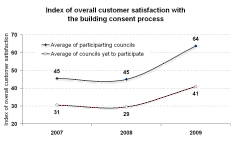|
CTMA home >> Media centre >> Building Consent and Inspection Services - 2009 Study
Building Consent and Inspection Services - ImprovingNational study suggests that the investment made by some councils during the past few years to improve service has begun to pay-off. Customer satisfaction is improving - but at some councils more than others.
Study director Paul Linnell explains, “The study has helped these councils learn from their customers about the specific issues that cause them the most concern. From this they have been able to set improvement priorities that will bring the biggest benefit to customer and council outcomes”. Problem experienceWith councils and their customers adapting to the changes in building legislation and accreditation, the study observed a small drop in the number of problems experienced by customers in 2008 and an even more significant drop in 2009. Again, this improvement appears most evident amongst councils who have participated in the annual study. Since the 2007 study, improvements at participating councils have brought an average reduction in the number of customers experiencing problems of 27 percentage points, compared to a reduction of only 15 percentage points amongst other councils. The specific types of problems experienced by the customers of each council vary. From the study findings, each participating council has learned of their own individual strengths and opportunities for improvement. This provides them with a focus for service improvement investments for the coming year and a useful comparison with the performance of other councils. Building consent process:Generally, the most significant “points of pain” for customers seeking building consents involve issues that have a direct impact on the eventual cost of their projects and on the time taken to complete them. This is evident from study findings regarding customer dissatisfaction with:
However, the study has identified other more specific issues at individual councils, some of which have been more straightforward to address. These vary but include:
Building inspection services:Generally, with building inspection services, customers are least satisfied with the value for money offered by the service. But again, specific problems vary from one council to another. Some of the key problems experienced with building inspection services included:
Impact of poor service:Customer dissatisfaction and the problems that can occur with building consent and inspection services can lead to increased costs to councils. These costs can arising from reduced customer co-operation, increased complaint-handling, customer disenfranchisement and increased compliance costs. The study has found that those customers who were “very satisfied” with building consent and inspection services are more likely to believe that (i) the council “helped them achieve a more successful outcome to their project”, and that (ii) building legislation “helped them achieve a safe and durable structure”. However, the study found that these desirable strategic outcomes quickly become undermined as soon as customers experience problems with building consent and inspection services. When customers are less satisfied, the study found a significant drop in support for the council, negatively impacting a number of key social and economic outcomes. For example, the ease of doing business with a local council appears to be having an increasing influence on builders and developers when making regional investment decisions, with some respondents stating that they plan to never again develop in some areas. Also, difficulties encountered in the consent process and, in particular, a failure to see value-for-money for the services provided by the council may lead to some smaller projects being undertaken without applying for the necessary consent. (Some respondents stating that the costs are discouraging owners from applying for consent). The next national baseline study:CTMA will be conducting a further update study towards the end of 2010. The study will again help participating councils identify sources of customer dissatisfaction and set service improvement priorities. The nationwide approach to the study also provides the opportunity for comparative measurements between councils. Councils wishing to participate in the 2010 National Customer Experience Baseline Study of Building Consents and Inspection Services should contact CTMA for registration details. About CTMA New Zealand Ltd.CTMA is a service quality improvement firm that provides a range of consulting and customer satisfaction research services to help organisations build loyalty and advocacy by improving their service to customers. Its consulting and research services help organisations identify sources of customer dissatisfaction, prioritise remedial actions and improve the customer experience. In addition to its client-specific services, CTMA also conducts benchmarking and best-practice studies to help public and private sector organisations develop their customer relationship strategies.
|
